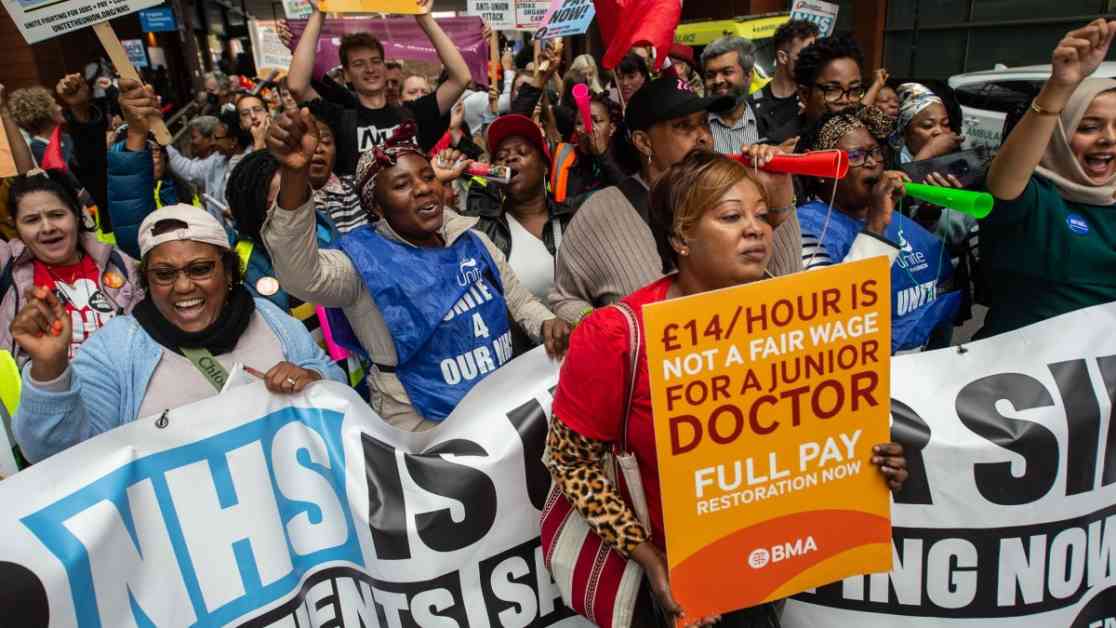Junior doctors in England have finally reached a resolution in their long-standing pay dispute with the government, bringing an end to 18 months of strikes. The British Medical Association (BMA) recently announced that junior doctors have voted to accept a pay deal offered by the government, which will see an average increase of 22.3 per cent over the span of two years.
Details of the Pay Deal
The pay deal, which was made during Labour’s first month in office, includes an average pay increase of 4.05 per cent for junior doctors, to be backdated to last April. This pay rise comes on top of the existing pay award already received for 2023-24, worth an average of 9 per cent. Additionally, each part of the pay scale will be uplifted by 6 per cent plus £1000 with an effective date of 1 April 2024, as recommended by the Review Body on Doctors’ and Dentists’ Remuneration (DDRB).
With the acceptance of this deal, a doctor starting foundational training in the NHS will now receive a base pay of £36,600, up from about £32,400. The BMA junior doctors committee co-chairs, Dr. Robert Laurenson and Dr. Vivek Trivedi, welcomed the news, but also cautioned that there is still work to be done. They emphasized that pay levels remain below where they were in real terms in 2008, and expressed hope for further progress in the future.
Resolution of the Dispute
The resolution of this pay dispute marks a significant milestone for junior doctors, who have been embroiled in a lengthy battle for fair compensation. The dispute began in 2022 when the union demanded pay increases to restore junior doctors’ earnings to the real term levels of 2008. This demand led to a ballot in which more than 98 per cent of respondents supported strike action, ultimately resulting in 11 separate strikes over the course of 18 months.
The prolonged industrial action had a significant impact on the healthcare system, with more than one million appointments and operations being postponed. Health Secretary Wes Streeting entered formal talks with junior doctors upon taking office, in a bid to end the strikes and find a resolution to the ongoing dispute. The eventual acceptance of the pay deal by junior doctors signifies a step towards restoring stability and normalcy within the healthcare sector.
Reactions to the Pay Deal
Following the acceptance of the pay deal, various stakeholders have expressed their reactions and thoughts on the resolution of the dispute. Amanda Pritchard, chief executive of NHS England, welcomed the news, stating that the agreement provides much-needed certainty as the healthcare system prepares for the challenges of the upcoming winter season. She emphasized the crucial role that junior doctors play in the NHS and highlighted the importance of valuing and supporting their contributions.
Danny Mortimer, chief executive of NHS Employers, echoed similar sentiments, expressing relief that the pay dispute has come to an end. He acknowledged the disruptive impact that industrial action has had on the NHS over the past two years and emphasized the need to address the wider issues raised by resident doctors, beyond just pay. Mortimer expressed hope for continued collaboration with the BMA, medical colleges, the General Medical Council (GMC), and NHS England to address these issues and implement the agreed-upon changes.
Future Implications
Looking ahead, the acceptance of the pay deal by junior doctors sets a precedent for future negotiations and discussions surrounding healthcare worker compensation. The resolution of this dispute serves as a testament to the importance of fair pay and recognition for the essential work carried out by healthcare professionals, particularly in challenging circumstances such as those faced during the COVID-19 pandemic.
As the healthcare sector continues to evolve and adapt to changing needs and demands, it is essential that the contributions of healthcare workers, including junior doctors, are valued and supported. The successful resolution of this pay dispute represents a step towards strengthening the healthcare workforce and ensuring that frontline workers are adequately compensated for their dedication and hard work.
In conclusion, the acceptance of the government pay deal by junior doctors in England marks a significant milestone in the ongoing efforts to address pay disparities and ensure fair compensation for healthcare workers. This resolution not only brings an end to 18 months of strikes but also sets a positive tone for future negotiations and discussions within the healthcare sector. By recognizing the contributions of junior doctors and valuing their work, we can create a more sustainable and supportive environment for healthcare professionals to thrive and continue providing high-quality care to patients.













